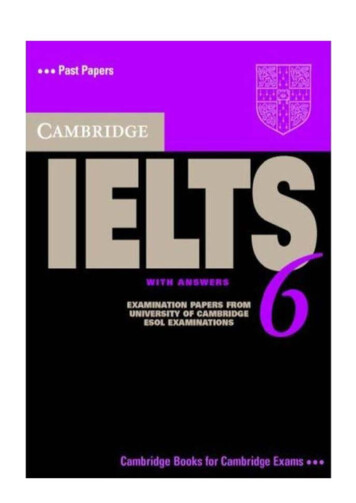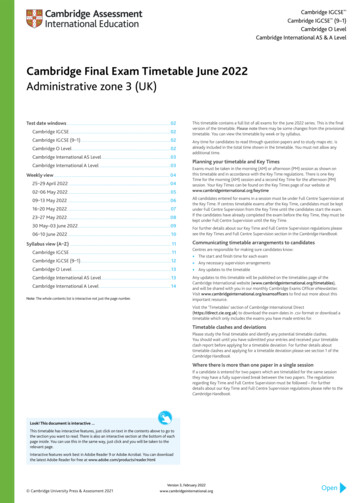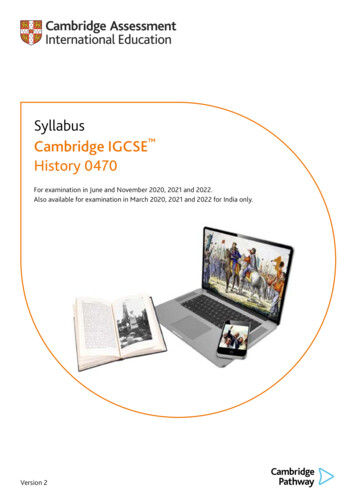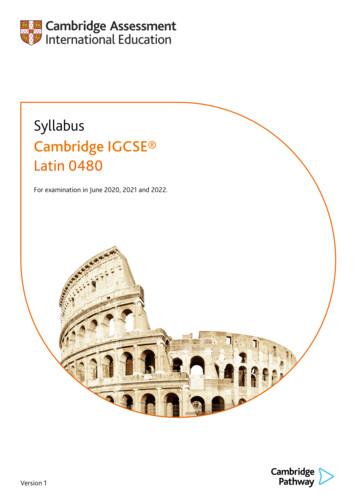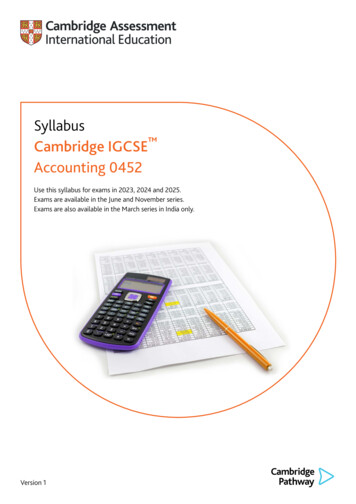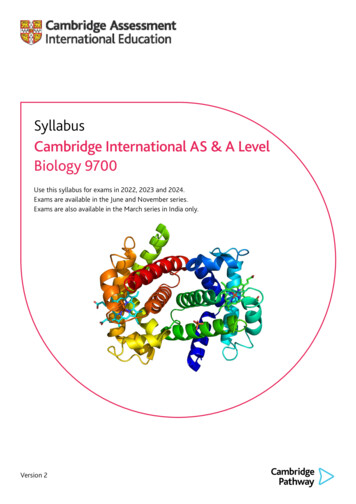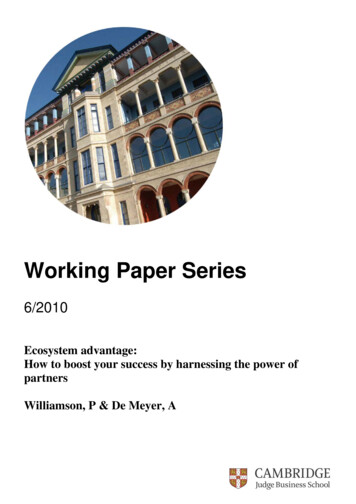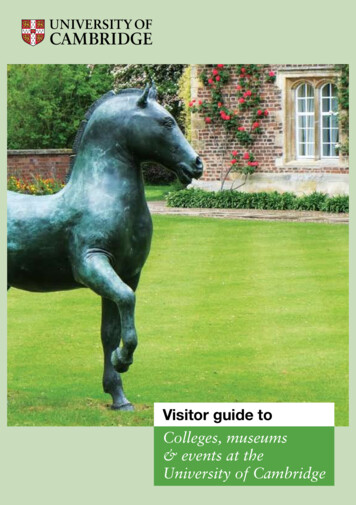
Transcription
SyllabusCambridge International AS & A LevelSociology 9699For examination in June and November 2021, 2022 and 2023.Also available for examination in March 2021, 2022 and 2023 for India only.Version 1
Why choose Cambridge International?Cambridge Assessment International Education prepares school students for life, helping them develop an informedcuriosity and a lasting passion for learning. We are part of the University of Cambridge.Our Cambridge Pathway gives students a clear path for educational success from age 5 to 19. Schools can shapethe curriculum around how they want students to learn – with a wide range of subjects and flexible ways to offerthem. It helps students discover new abilities and a wider world, and gives them the skills they need for life, so theycan achieve at school, university and work.Our programmes and qualifications set the global standard for international education. They are created by subjectexperts, rooted in academic rigour and reflect the latest educational research. They provide a strong platform forstudents to progress from one stage to the next, and are well supported by teaching and learning resources.We review all our syllabuses regularly, so they reflect the latest research evidence and professional teachingpractice – and take account of the different national contexts in which they are taught.We consult with teachers to help us design each syllabus around the needs of their learners. Consulting withleading universities has helped us make sure our syllabuses encourage students to master the key concepts in thesubject and develop the skills necessary for success in higher education.Our mission is to provide educational benefit through provision of international programmes and qualifications forschool education and to be the world leader in this field. Together with schools, we develop Cambridge learnerswho are confident, responsible, reflective, innovative and engaged – equipped for success in the modern world.Every year, nearly a million Cambridge students from 10 000 schools in 160 countries prepare for their future withthe Cambridge Pathway.‘We think the Cambridge curriculum is superb preparation for university.’Christoph Guttentag, Dean of Undergraduate Admissions, Duke University, USAQuality managementCambridge International is committed to providing exceptional quality. In line with this commitment, ourquality management system for the provision of international qualifications and education programmes forstudents aged 5 to 19 is independently certified as meeting the internationally recognised standard,ISO 9001:2015. Learn more at www.cambridgeinternational.org/ISO9001Copyright UCLES September 2018Cambridge Assessment International Education is part of the Cambridge Assessment Group. Cambridge Assessment is the brand name ofthe University of Cambridge Local Examinations Syndicate (UCLES), which itself is a department of the University of Cambridge.UCLES retains the copyright on all its publications. Registered centres are permitted to copy material from this booklet for their owninternal use. However, we cannot give permission to centres to photocopy any material that is acknowledged to a third party even forinternal use within a centre.
Contents1 Why choose this syllabus? .22 Syllabus overview . 6Aims6Content overview7Assessment overview9Assessment objectives113 Subject content .13Paper 1 – Socialisation, identity and methods of research13Paper 2 – The Family15Paper 3 – Education16Paper 4 – Globalisation17Paper 4 – Media19Paper 4 – Religion204 Details of the assessment . 22Paper 1 – Socialisation, identity and methods of research22Paper 2 – The Family23Paper 3 – Education23Paper 4 – Globalisation, Media and Religion24Command words255 What else you need to know . 26Before you start26Making entries27After the exam28How students, teachers and higher education can use the grades29Grade descriptions29Changes to this syllabus for 2021, 2022 and 202330Changes to this syllabusFor information about changes to this syllabus for 2021, 2022 and 2023, go to page 30.
Cambridge International AS & A Level Sociology 9699 syllabus for 2021, 2022 and 2023.1 Why choose this syllabus?Key benefitsThe best motivation for a student is a real passion for the subjectthey’re learning. By offering students a variety of CambridgeInternational AS & A Levels, you can give them the greatest chanceof finding the path of education they most want to follow. Withover 50 subjects to choose from, students can select the onesthey love and that they’re best at, which helps motivate themthroughout their studies.Following a Cambridge International AS & A Level programmehelps students develop abilities which universities value highly,including: a deep understanding of their subjects higher order thinking skills – analysis, critical thinking,problem solving presenting ordered and coherent arguments independent learning and research.Cambridge International AS & A Level Sociology encourages learners to think sociologically aboutcontemporary social, cultural and political issues. The syllabus provides opportunities to explore key conceptsand debates that underpin the discipline of sociology and to develop the skills of interpretation, application,analysis and evaluation while studying a range of stimulating topics and real-world issues.Our approach in Cambridge International AS & A Level Sociology encourages learners to be:confident, communicating sociological ideas and arguments to others, and exploring contemporary social issueswith maturity and insightresponsible, recognising the importance of culture and community and able to appreciate cultural differences andalternative perspectives on social issuesreflective, reviewing and refining their skills of analysis and evaluation and drawing connections between specificexamples and wider issuesinnovative, developing informed views about real-world issues, and an ability to think sociologically to understandproblems and respond to questionsengaged, learning through independent study and collaboration; debating issues and using research findings totackle sociological questions.‘Cambridge students develop a deep understanding of subjects and independent thinking skills.’Tony Hines, Principal, Rockledge High School, USA2www.cambridgeinternational.org/alevelBack to contents page
Cambridge International AS & A Level Sociology 9699 syllabus for 2021, 2022 and 2023. Why choose this syllabus?Key conceptsKey concepts are essential ideas that help students develop a deep understanding of their subject and make linksbetween different aspects. Key concepts may open up new ways of thinking about, understanding or interpretingthe important things to be learned.Good teaching and learning will incorporate and reinforce a subject’s key concepts to help students gain: a greater depth as well as breadth of subject knowledge confidence, especially in applying knowledge and skills in new situations the vocabulary to discuss their subject conceptually and show how different aspects link together a level of mastery of their subject to help them enter higher education.The key concepts identified below, carefully introduced and developed, will help to underpin the course you willteach. You may identify additional key concepts which will also enrich teaching and learning.The key concepts for Cambridge International AS & A Level Sociology are: Inequality and opportunityInequality has a major influence on people’s opportunities and life choices. Sociologists study the differentforms of inequality (age, ethnicity, gender, class), seeking to understand why inequality exists and how itaffects different sections of society. Power, control and resistancePower is important in understanding how order and control are achieved in society. There are many differenttheories about who holds power and how power is used to shape human behaviour. Sociologists are alsointerested in the ways people oppose and resist the exercise of power. Social change and developmentUnderstanding how societies have changed and developed helps sociologists to make sense of the way peoplelive today. The change from traditional society to modern industrial society is particularly important. The terms‘modernity’ and ‘post-modernity’ are used to reflect on this transition and on contemporary issues, such ashow societies are affected by globalisation and the digital revolution in technology. Socialisation, culture and identitySociologists believe that people learn how they are expected to behave through socialisation. The norms andvalues learned through socialisation may vary between cultures, impacting on social identity. The study ofdifferent social identities is central to contemporary sociology. Structure and human agencyA central debate in sociology concerns the relationship between the individual and society: is behaviour shapedby wider social forces or is the social world shaped by the actions of individuals? Structural theories focuson how people’s behaviour is constrained by social systems and institutions. Action theories emphasise howindividuals establish meaning through social interaction and how this impacts on the behaviour of social groupsand institutions.Back to contents pagewww.cambridgeinternational.org/alevel3
Cambridge International AS & A Level Sociology 9699 syllabus for 2021, 2022 and 2023. Why choose this syllabus?Recognition and progressionOur expertise in curriculum, teaching and learning, and assessment is the basis for the recognition of ourprogrammes and qualifications around the world. Every year thousands of students with Cambridge InternationalAS & A Levels gain places at leading universities worldwide. They are valued by top universities around the worldincluding those in the UK, US (including Ivy League universities), Europe, Australia, Canada and New Zealand.UK NARIC, the national agency in the UK for the recognition and comparison of international qualifications andskills, has carried out an independent benchmarking study of Cambridge International AS & A Level and found it tobe comparable to the standard of AS & A Level in the UK. This means students can be confident that their CambridgeInternational AS & A Level qualifications are accepted as equivalent, grade for grade, to UK AS & A Levels by leadinguniversities worldwide.Cambridge International AS Level Sociology makes up the first half of the Cambridge International A Level coursein sociology and provides a foundation for the study of sociology at Cambridge International A Level. Depending onlocal university entrance requirements, students may be able to use it to progress directly to university courses insociology or some other subjects. It is also suitable as part of a course of general education.Cambridge International A Level Sociology provides a foundation for the study of sociology or related courses inhigher education. Equally it is suitable as part of a course of general education.For more information about the relationship between the Cambridge International AS Level and CambridgeInternational A Level see the ‘Assessment overview’ section of the Syllabus overview.We recommend learners check the Cambridge recognitions database and the university websites to find the mostup-to-date entry requirements for courses they wish to study.Learn more at www.cambridgeinternational.org/recognition‘The depth of knowledge displayed by the best A Level students makes them prime targets forAmerica’s Ivy League universities’Yale University, USA4www.cambridgeinternational.org/alevelBack to contents page
Cambridge International AS & A Level Sociology 9699 syllabus for 2021, 2022 and 2023. Why choose this syllabus?Supporting teachersWe provide a wide range of practical resources, detailed guidance, and innovative training and professionaldevelopment so that you can give your learners the best possible preparation for Cambridge InternationalAS & A Level.Teaching resourcesExam preparation resources School Support Hubwww.cambridgeinternational.org/support Question papers Syllabuses Schemes of work Example candidate responses to understandwhat examiners are looking for at key grades Learner guides Examiner reports to improve future teaching Mark schemes Discussion forums Endorsed resourcesTraining Introductory – face-to-face or online Extension – face-to-face or online Enrichment – face-to-face or online Coursework – online Cambridge Professional DevelopmentQualificationsSupportfor CambridgeInternationalAS & A LevelCommunityYou can find useful information, as well asshare your ideas and experiences with otherteachers, on our social media channels andcommunity forums.Find out more atwww.cambridgeinternational.org/social-mediaFind out more ge International AS & A Levels prepare students well for university because they’velearnt to go into a subject in considerable depth. There’s that ability to really understand thedepth and richness and the detail of a subject. It’s a wonderful preparation for what they aregoing to face at university.’US Higher Education Advisory CouncilBack to contents pagewww.cambridgeinternational.org/alevel5
Cambridge International AS & A Level Sociology 9699 syllabus for 2021, 2022 and 2023.2 Syllabus overviewAimsThe aims describe the purposes of a course based on this syllabus.The aims are to enable students to develop: knowledge and understanding of sociological terms, theories, methods and research findings an awareness of the range and limitations of sociological theory and the ability to compare and contrastdifferent theoretical perspectives an appreciation and understanding of individual, social and cultural diversity, and of continuity and change insocial life an understanding of sociological research methods, including issues concerned with the planning,implementation and evaluation of research enquiry and the collection, analysis and interpretation of data improved skills of communication, interpretation, analysis and evaluation skills for further study.Support for Cambridge International AS & A Level SociologyOur School Support Hub www.cambridgeinternational.org/support provides Cambridge schools with asecure site for downloading specimen and past question papers, mark schemes, grade thresholds and othercurriculum resources specific to this syllabus. The School Support Hub community offers teachers theopportunity to connect with each other and to ask questions related to the k to contents page
Cambridge International AS & A Level Sociology 9699 syllabus for 2021, 2022 and 2023. Syllabus overviewContent overviewThis table gives an overview of the syllabus content for Cambridge International AS & A Level Sociology.Paper 1 – Socialisation, identity and methods of researchSocialisation and the creation of social identity The process of learning and socialisation Social control, conformity and resistance Social identity and changeMethods of research Types of data, methods and research design Approaches to sociological research Research issuesPaper 2 – The FamilyTheories of the family and social change Perspectives on the role of the family Diversity and social changeFamily roles and changing relationships Gender equality and experiences of family life Age and family lifePaper 3 – EducationEducation and society Theories about the role of education Education and social mobility Influences on the curriculumEducation and inequality Intelligence and educational attainment Social class and educational attainment Ethnicity and educational attainment Gender and educational attainmentBack to contents pagewww.cambridgeinternational.org/alevel7
Cambridge International AS & A Level Sociology 9699 syllabus for 2021, 2022 and 2023. Syllabus overviewPaper 4 – Globalisation, Media and ReligionGlobalisationKey debates, concepts and perspectives Perspectives on globalisation Globalisation and identity Globalisation, power and politicsContemporary issues Globalisation, poverty and inequalities Globalisation and migration Globalisation and crimeMediaOwnership and control of the media Traditional media and the new media Theories of the media and influences on mediacontent The impact of the new mediaMedia representation and effects Media representations of class, gender, ethnicity, andage groups Different models of media effects The impact of the media on behaviourReligionReligion and social order Religion and society Religion and social order Religion as a source of social changeThe influence of religion The secularisation debate Gender, feminism and religion Religion and elBack to contents page
Cambridge International AS & A Level Sociology 9699 syllabus for 2021, 2022 and 2023. Syllabus overviewAssessment overviewPaper 1Socialisation, identityand methods of researchPaper 31 hour 30 minutesEducation1 hour 15 minutes50 marks60 marksCandidates answer four questions.Candidates answer four compulsory questions.Question 4 is an essay (26 marks).Section A: three compulsory questionsExternally assessedSection B: one essay (26 marks) from a choiceof two20% of the A LevelExternally assessed50% of the AS Level25% of the A LevelPaper 2The FamilyPaper 41 hour 30 minutes60 marksCandidates answer four questions.Section A: three compulsory questionsSection B: one essay (26 marks) from a choiceof twoExternally assessed50% of the AS Level25% of the A LevelGlobalisation, Mediaand Religion1 hour 45 minutes70 marksCandidates answer two essay questions(35 marks each).Section A: GlobalisationSection B: MediaSection C: ReligionEach section has two essay questions.Candidates select one question from twodifferent sections.Externally assessed30% of the A LevelInformation on availability is in the Before you start section.Back to contents pagewww.cambridgeinternational.org/alevel9
Cambridge International AS & A Level Sociology 9699 syllabus for 2021, 2022 and 2023. Syllabus overviewThere are three routes for Cambridge International AS & A Level Sociology:Route12AS Level only(Candidates take all AS componentsin the same exam series)A Level (staged over two years)Year 1 AS Level*Paper 1Paper 2 Year 2 Complete the A Level3A Level(Candidates take all components inthe same exam series) Paper 3Paper 4 * Candidates carry forward their AS Level result subject to the rules and time limits described in the Cambridge Handbook.Candidates following an AS Level route will be eligible for grades a–e. Candidates following an A Level route areeligible for grades A*–E.10www.cambridgeinternational.org/alevelBack to contents page
Cambridge International AS & A Level Sociology 9699 syllabus for 2021, 2022 and 2023. Syllabus overviewAssessment objectivesThe assessment objectives (AOs) are:AO1 Knowledge and understandingDemonstrating knowledge and understanding of: sociological concepts, theories, evidence, views, research methods, arguments and debates the theoretical and practical considerations that influence the design and execution of sociological research relevant sociological research findings.AO2 Interpretation and applicationInterpreting sociological material, including concepts, theories and evidence, and applying this to a range of issues.This includes: using relevant sociological material to support points or develop arguments explaining how sociological material is applicable to a particular issue or question demonstrating awareness of the links between the concepts, theories and evidence used to support points ordevelop arguments.AO3 Analysis and evaluationAnalysing and evaluating sociological theories, evidence, views, research methods, and arguments. This includes: explaining the strengths and limitations of sociological theories, views and research methods developing arguments against sociological theories and views investigating sociological theories and arguments to reveal underlying assumptions, value judgements,misconceptions, logical flaws and ideological influences discussing counter viewpoints or evidence to demonstrate the complexity of sociological issues and debates recognising the limitations of, or bias in, sociological and non-sociological evidence reaching conclusions based on a reasoned consideration of available evidence and arguments.Back to contents pagewww.cambridgeinternational.org/alevel11
Cambridge International AS & A Level Sociology 9699 syllabus for 2021, 2022 and 2023. Syllabus overviewWeighting for assessment objectivesThe approximate weightings allocated to each of the assessment objectives (AOs) are summarised below.Assessment objectives as a percentage of each qualificationAssessment objectiveWeighting in AS Level %Weighting in A Level %AO1 Knowledge and understanding4035AO2 Interpretation and application3030AO3 Analysis and evaluation3035Total100100Assessment objectives as a percentage of each componentAssessment objective12Weighting in components %Paper 1Paper 2Paper 3Paper 4AO1 Knowledge and understanding40403626AO2 Interpretation and application30302831AO3 Analysis and ternational.org/alevelBack to contents page
Cambridge International AS & A Level Sociology 9699 syllabus for 2021, 2022 and 2023.3 Subject contentCandidates for Cambridge International AS Level should study the AS Level content for Paper 1 and Paper 2.Candidates for Cambridge A Level should study all the syllabus content for Paper 1, Paper 2, Paper 3 and at leasttwo of the three topic areas for Paper 4.The content for each component is detailed below.AS LevelPaper 1 – Socialisation, identity and methods of researchPaper 2 – The FamilyA LevelPaper 3 – EducationPaper 4 – GlobalisationPaper 4 – MediaPaper 4 – ReligionPaper 1 – Socialisation, identity and methods of researchThis topic area has two central aims: first, to examine the role of socialisation in the creation of social identities;second, to introduce the basic methods of research, including concepts that can be used to evaluate the relevanceand accuracy of sociological findings.1Socialisation and the creation of social identityCandidates will explore the relationship between the individual and society, and how social order is maintainedand resisted, drawing on the key concepts of Socialisation, culture and identity and Power, control and resistance.Candidates will consider contrasting views of the relationship between the individual and society, and changesin social identity, which can be linked to the key concepts of Structure and human agency and Social change anddevelopment.1.1The process of learning and socialisation Culture, roles, norms, values, beliefs, customs, ideology, power and status as elements in the socialconstruction of reality. The importance of socialisation in influencing human behaviour, including the nurture versus nature debate. Agencies of socialisation and social control, including family, education, peer group, media and religion.1.2Social control, conformity and resistance The role of structure and agency in shaping the relationship between the individual and society, including anawareness of the differences between structuralist and interactionist views. Factors explaining why individuals conform to social expectations, including sanctions, social pressure, selfinterest and social exchange. The mechanisms through which order is maintained, including power, ideology, force and consensus. How sociologists explain deviance and non-conformity, including subcultures, under-socialisation,marginalisation, cultural deprivation and social resistance.Back to contents pagewww.cambridgeinternational.org/alevel13
Cambridge International AS & A Level Sociology 9699 syllabus for 2021, 2022 and 2023. Subject content1.3Social identity and change Social class, gender, ethnicity and age as elements in the construction of social identity. How social class, gender, ethnicity and age identities may be changing due to globalisation, increased choiceand the creation of new/hybrid identities.2Methods of researchCandidates will examine the different research methods and types of data used in sociological research,exploring the strengths and limitations of these. They will look at the process of designing research, and at keyideas for assessing the value of different research methods. Candidates will examine questions such as whethersociology can and should be based on the natural sciences.2.1Types of data, methods and research design The differences between primary and secondary sources of data and between quantitative and qualitativedata. The strengths and limitations of different secondary sources of data, including official statistics, personaldocuments, digital content and media sources. The strengths and limitations of different quantitative research methods, including questionnaires,structured interviews, experiments and content analysis. The strengths and limitations of different qualitative research methods, including overt and covertparticipant and non-participant observation, unstructured interviews, semi-structured interviews and groupinterviews. Stages of research design, including deciding on research strategy, formulating research questions andhypotheses, sampling frames, sampling techniques, pilot studies, operationalisation, conducting researchand interpreting results.2.2Approaches to sociological research The use of approaches drawing on different research methods, including case studies, social surveys,ethnography and longitudinal studies. The mixed methods approach to research, including triangulation and methodological pluralism. The positivist approach, with reference to scientific method, objectivity, reliability and value-freedom. The interpretivist approach, with reference to verstehen, meaning, subjectivity and validity. The debates about whether sociology can/should be based on the methods and procedures of the naturalsciences and the role of values in sociological research.2.3Research issues The theoretical, practical and ethical considerations influencing the choice of topic, choice of method(s) andconduct of research. How research findings may be biased by the actions and values of the sociologist and by choices made infunding, designing and conducting the research. Validity, reliability, objectivity, representativeness and ethics as important concepts in assessing the value ofdifferent research k to contents page
Cambridge International AS & A Level Sociology 9699 syllabus for 2021, 2022 and 2023. Subject contentPaper 2 – The FamilyThis topic area develops candidates’ understanding of the family in a social context. The aim is to explore differentsociological perspectives on the role of the family and family diversity, and to understand the way social changeinfluences family life and different family members.3Theories of the family and social changeCandidates will explore different perspectives of the role of the family in society, giving an opportunity for themto reflect on the key concepts of Power, control and resistance, and Socialisation, culture and identity. Candidateswill examine the effects of social change on the diversity of family and household forms, which link to the keyconcept of Social change and development.3.1Perspectives on the role of the family Functionalist accounts of how the family benefits its members and society and how the functions of familieshave changed over time, including the ‘loss of functions’ debate. Marxist accounts of how the family benefits capitalism, including ideological control, reproduction of labourand consumption. Feminist responses to functionalist and Marxist accounts of the role of the family.3.2Diversity and social change The causes and consequences of changing patterns of marriage, cohabitation, divorce and separation. Different family and household forms, including nuclear, extended, lone-parent, reconstituted, same-sexfamilies, families of choice and single-person households. Dimensions of family diversity, including organisational, cultural and class diversity. The debate about the extent of family diversity and the dominance of the nuclear family. New Right and postmodernist perspectives on family diversity. The state and social policy as influences on the family.4Family roles and changing relationshipsCandidates will consider different ways in which the behaviours of some family members are controlled byothers, and will examine equality in the family. These issues provide a context for the key concepts of Power,control and resistance, and Inequality and opportunity.4.1Gender equality and experiences of family life Different feminist perspectives on equality and power in the family, including liberal, radical and Marxistfeminist. Conjugal roles and debates about gender equality in the family, including housework, childcare, power andemotion work. Debates about whether the experience of family life is positive or negative for family members.4.2Age and family life The social construction of childhood, and changes in the role and social position o
The key concepts for Cambridge International AS & A Level Sociology are: Inequality and opportunity Inequality has a major influence on people's opportunities and life choices. Sociologists study the different forms of inequality (age, ethnicity, gender, class), seeking to understand why inequality exists and how it .
